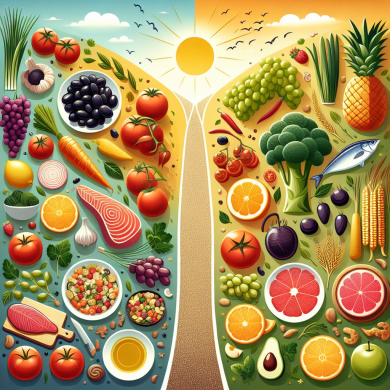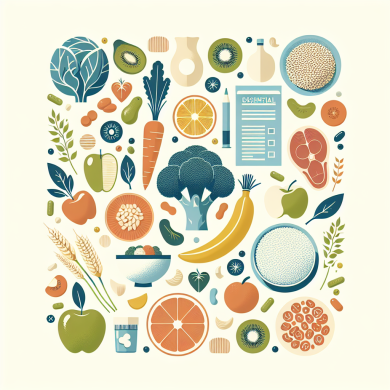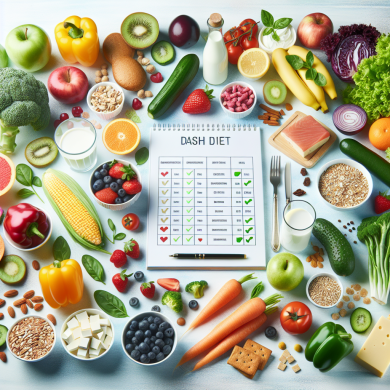Essential DASH Diet Foods for Healthier Living
The Dietary Approaches to Stop Hypertension (DASH) diet is a well-researched and widely recommended diet plan aimed at reducing blood pressure and promoting overall health. It emphasizes the consumption of nutrient-rich foods that are low in sodium, saturated fats, and added sugars. This article explores the essential foods that form the backbone of the DASH diet, providing insights into how they contribute to healthier living.
Understanding the DASH Diet
The DASH diet was originally developed to help individuals manage hypertension, but its health benefits extend far beyond just lowering blood pressure. It encourages a balanced intake of macronutrients and micronutrients, promoting heart health, weight management, and reduced risk of chronic diseases.
The core components of the DASH diet include fruits, vegetables, whole grains, lean proteins, and low-fat dairy. It also advocates for the reduction of sodium intake and the consumption of foods rich in potassium, calcium, and magnesium.
Fruits: Nature’s Sweet Solution
Fruits are integral to the DASH diet due to their rich content of vitamins, minerals, and antioxidants. They are naturally low in sodium and calories, making them ideal for heart health and weight management.
Berries
Berries, such as strawberries, blueberries, and raspberries, are packed with antioxidants and fiber. They help reduce inflammation and improve heart health. Incorporating a variety of berries into your diet can contribute to lower blood pressure and a reduced risk of cardiovascular diseases.
Bananas
Bananas are an excellent source of potassium, a mineral that plays a crucial role in blood pressure regulation. By balancing sodium levels in the body, potassium helps alleviate hypertension. Including bananas in your daily diet can significantly contribute to maintaining healthy blood pressure levels.
Vegetables: Nutrient Powerhouses
Vegetables form the foundation of the DASH diet due to their high nutrient density and low calorie content. They are rich in fiber, vitamins, and minerals, making them essential for heart health and disease prevention.
Leafy Greens
Leafy greens like spinach, kale, and Swiss chard are abundant in vitamins A, C, and K, as well as minerals like magnesium and potassium. These nutrients support healthy blood pressure and reduce the risk of heart disease. Adding a variety of leafy greens to your meals can enhance their nutritional value significantly.
Cruciferous Vegetables
Cruciferous vegetables, including broccoli, cauliflower, and Brussels sprouts, are rich in fiber and antioxidants. They have been linked to reduced inflammation and improved cardiovascular health. Including these vegetables in your diet can bolster your defenses against hypertension and other chronic conditions.
Whole Grains: The Fiber-Rich Base
Whole grains are a staple of the DASH diet, providing essential fiber, vitamins, and minerals. They help regulate blood sugar levels, reduce cholesterol, and support digestive health.
Oats
Oats are a great source of soluble fiber, particularly beta-glucan, which has been shown to lower cholesterol levels and improve heart health. Incorporating oats into your breakfast routine can provide sustained energy and contribute to overall cardiovascular wellness.
Quinoa
Quinoa is a versatile whole grain that is rich in protein, fiber, and essential amino acids. It is gluten-free and suitable for individuals with gluten sensitivities. Quinoa’s nutrient profile makes it an excellent choice for promoting heart health and maintaining stable blood pressure levels.
Lean Proteins: Building Blocks of Health
Lean proteins are an important component of the DASH diet, providing essential amino acids and supporting muscle health. They are also low in saturated fats, making them heart-friendly choices.
Poultry
Skinless chicken and turkey are excellent sources of lean protein. They are versatile, easy to prepare, and can be incorporated into a variety of dishes. Opting for skinless poultry helps reduce saturated fat intake, promoting better heart health.
Fish
Fatty fish, such as salmon, mackerel, and sardines, are rich in omega-3 fatty acids. These healthy fats have been shown to reduce inflammation, lower blood pressure, and improve heart health. Including fish in your diet at least twice a week can provide significant cardiovascular benefits.
Low-Fat Dairy: Calcium-Rich Choices
Low-fat dairy products are an important source of calcium, vitamin D, and protein. They support bone health and contribute to maintaining healthy blood pressure levels.
Yogurt
Low-fat yogurt is an excellent source of probiotics, which promote gut health and enhance nutrient absorption. Choosing plain, unsweetened yogurt helps avoid added sugars while providing a creamy and nutritious snack or breakfast option.
Milk
Low-fat or skim milk provides essential nutrients like calcium and vitamin D without the added saturated fats found in whole milk. Incorporating milk into your daily diet can support bone health and contribute to overall nutritional balance.
Healthy Fats: Nuts and Seeds
While the DASH diet emphasizes low saturated fat intake, it encourages the consumption of healthy fats from sources like nuts and seeds. These foods provide essential fatty acids, fiber, and antioxidants.
Almonds
Almonds are a rich source of monounsaturated fats, fiber, and vitamin E. They have been linked to reduced cholesterol levels and improved heart health. Including a small handful of almonds as a snack can provide a satisfying and heart-healthy option.
Flaxseeds
Flaxseeds are high in omega-3 fatty acids, fiber, and lignans. They can be added to smoothies, yogurt, or oatmeal to boost nutritional content. Consuming flaxseeds regularly can contribute to lower blood pressure and improved cardiovascular health.
Spices and Herbs: Flavorful Enhancements
To reduce sodium intake, the DASH diet encourages the use of spices and herbs to enhance flavor without relying on salt. These additions can make meals more enjoyable while providing additional health benefits.
Garlic
Garlic is known for its potential to lower blood pressure and improve heart health. It adds a robust flavor to dishes and can be used in various recipes. Incorporating garlic into your meals can provide both culinary and health benefits.
Basil
Basil is a versatile herb that adds a fresh and aromatic flavor to dishes. It is rich in antioxidants and anti-inflammatory compounds. Including basil in your cooking can enhance the taste and nutritional profile of your meals.
Conclusion: A Path to Healthier Living
The DASH diet’s focus on nutrient-rich, whole foods provides a comprehensive approach to healthier living. By incorporating a variety of fruits, vegetables, whole grains, lean proteins, low-fat dairy, healthy fats, and flavorful herbs into your diet, you can significantly improve your blood pressure, heart health, and overall well-being. Embracing the DASH diet as a lifestyle choice can pave the way for a healthier and more vibrant life.















Add comment